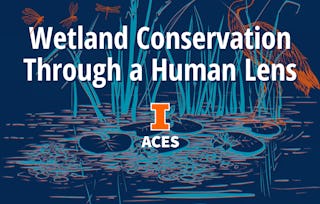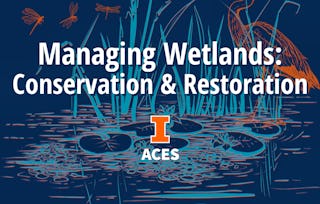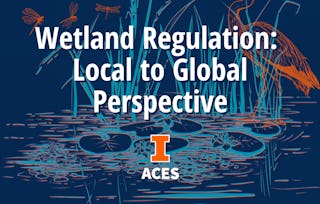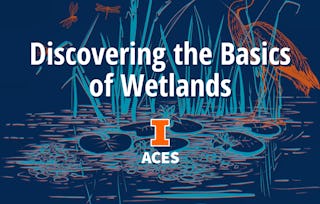This course will have a special focus on the impacts caused by humans on wetlands and the efforts made to conserve and restore these systems. The learners will gain a comprehensive understanding of the laws and regulations applicable to wetland conservation. They will also learn to evaluate the techniques used in restoration management and planning. Through case studies and interviews with managers, the learners will examine the essential elements for success and the limitations faced in practical restoration efforts.

Gain next-level skills with Coursera Plus for $199 (regularly $399). Save now.

Mitigating the Human Impact on Wetlands
This course is part of multiple programs.

Instructor: Caitlin Bloomer, Ph.D.
Included with
Recommended experience
What you'll learn
How current U.S. laws and regulations govern human impacts on wetlands.
The impact that human activities have on wetland ecosystem services and functions.
Skills you'll gain
Details to know

Add to your LinkedIn profile
6 assignments
See how employees at top companies are mastering in-demand skills

Build your subject-matter expertise
- Learn new concepts from industry experts
- Gain a foundational understanding of a subject or tool
- Develop job-relevant skills with hands-on projects
- Earn a shareable career certificate

There are 4 modules in this course
In the course orientation, you will become familiar with the course, your classmates, and our learning environment. The orientation will also help you obtain the technical skills required for the course. Then dive into the second part of this module to explore why wetland conservation is essential in maintaining the ecological functions, biodiversity, and ecosystem services provided by wetland ecosystems. In this module, we will explore the history of conservation programs and their contributions.
What's included
18 videos7 readings2 assignments1 discussion prompt1 plugin
You will explore why wetlands have been a topic of laws and regulations since early American history. Explore both historical and contemporary laws and regulations that have impacted wetlands in the United States.
What's included
12 videos2 readings1 assignment1 plugin
Wetland conservation is essential in maintaining the ecological functions, biodiversity, and ecosystem services provided by wetland ecosystems. In this module, we will explore the history or conservation programs and their contributions.
What's included
11 videos2 readings1 assignment2 plugins
In this module, you will explore video interviews with professionals from government agencies, consulting firms, and universities, showcasing the diverse work in wetland science and conservation. Discover their insights on regulatory changes, threats to ecosystems, and emerging trends or technologies that offer hope for the future. At the conclusion of this module, you will be ready to complete the final assessment for the course and earn your Coursera certificate!
What's included
7 videos4 readings2 assignments
Earn a career certificate
Add this credential to your LinkedIn profile, resume, or CV. Share it on social media and in your performance review.
Instructor

Offered by
Explore more from Environmental Science and Sustainability
 Status: Free Trial
Status: Free TrialUniversity of Illinois Urbana-Champaign
 Status: Free Trial
Status: Free TrialUniversity of Illinois Urbana-Champaign
 Status: Free Trial
Status: Free TrialUniversity of Illinois Urbana-Champaign
 Status: Free Trial
Status: Free TrialUniversity of Illinois Urbana-Champaign
Why people choose Coursera for their career




Frequently asked questions
Yes! Although completion of the Coursera course alone is not credit-bearing, it is a required component of a graduate-level Canvas course that can be "stacked" toward advanced credentials such as an academic (transcriptable) graduate certificate or a degree. If you decide to pursue further education, the credits you earn from this course can be applied toward a formal academic program, provided that you meet all the requirements of admission to the certificate or degree.
To access the course materials, assignments and to earn a Certificate, you will need to purchase the Certificate experience when you enroll in a course. You can try a Free Trial instead, or apply for Financial Aid. The course may offer 'Full Course, No Certificate' instead. This option lets you see all course materials, submit required assessments, and get a final grade. This also means that you will not be able to purchase a Certificate experience.
When you enroll in the course, you get access to all of the courses in the Specialization, and you earn a certificate when you complete the work. Your electronic Certificate will be added to your Accomplishments page - from there, you can print your Certificate or add it to your LinkedIn profile.
More questions
Financial aid available,





